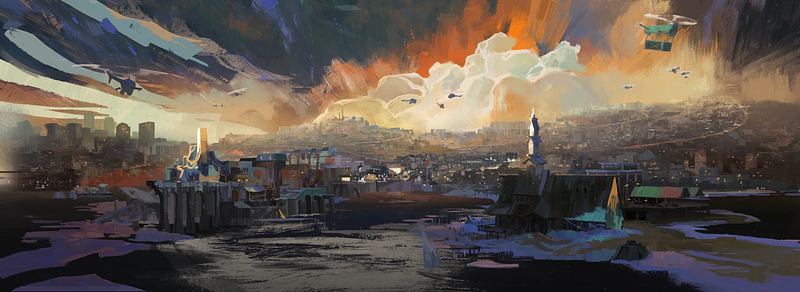
Disco Elysium
’s City of Revachol is one “dripping with atmosphere,” Armstrong ’27 states. Instead of a winter wonderland, Revachol is covered in slushy gutter snow, a layer of grime, hairline cracks, rotted antiques and rust. Photo courtesy of Disco Elysium Fandom.
Communism. Xenophobia. Bisexuality. Amphetamines. These things, and more, are what make up
Disco Elysium
—
The Final Cut
. Released in 2019 and published by ZA/UM,
Disco Elysium
tells the story of a derelict world similar to ours that is stuck in a post-war depression in the year 1951. The game has a 97% rating on Metacritic and a 93% positive review score on Steam, and so, looking for an RPG, I figured I would try it out. What I found was something that goes much, much deeper than anything I have seen before.
In the game, you play as a man who has quite literally drunk his memory away. Shortly after throwing on some soggy, vomit-stained party clothes, you learn that you are a detective and are on the job. Your partner, Kim Kitsuragi, meets you in the hotel lobby and informs you that you are supposed to be investigating the murder of a man hanging from a tree in the courtyard behind the hotel. From there, the story becomes one of self-discovery, union disputes, class struggle and just about everything else. Starting the game with amnesia is an interesting choice, but it grants two things that are invaluable in a role-playing setting: first, you get to approach the world from an outsider’s perspective — navigating the city of Revachol with fresh eyes allows the player to draw parallels between the game world and our own. Second, your character gets a fresh start. If you want to clean up your act, great! Say no to drugs, no to drinking; pull up your pants and get to work, ready to repair your shattered reputation as a detective…but you can just as easily fall to ruin.
The game is quick to offer interesting dilemmas. Measurehead, a towering tattooed guard, is a transparent racist, justifying his beliefs with craniometric pseudo-sciences and theories about how potatoes have made white people impotent. He espouses a theory of three racial groups: heroic, servile and a “vile race cauldron of pederasty” that is allegedly so grotesque that he refuses to comment on them entirely. Unfortunate, then, that you need Measurehead’s permission to enter the harbor, a crucial area for progression. The easiest means of doing this are by simply accepting his racist ideas as fact and internalizing whatever he tells you without question; even then he will not respect you, referring to you as his “unpromising” pupil, but at least you can be done with him. Oh, wait, you need him later to remove the corpse from the tree? Of course.
The city of Revachol is one dripping with atmosphere; not since
Inscryption
have I seen a game cowmmand presentation with such totality. The game is set in winter, but does not take up the mantle of beauty brought by snow-capped turrets — instead it bears the trained gray light and slushy gutter snow of February. The city is covered in a layer of grime that no one has bothered to wipe off since the war. Windows frittered with hairline cracks; lacquered antiques left to rot and rust in the street; people wandering about, covered head to toe in traces of their abject poverty. The neighborhood of Martinaise, where the murder has taken place, is choking
in the midst of a dockworker’s strike. As a member of the RCM, Revachol’s police force, you are often disrespected and even more frequently cursed out. Why bother with the police when the union can handle it?
The voice acting in this game lends just as much depth to the world as the visuals. Every character is voiced, and all of them are done excellently. In particular, Lenval Brown does a stellar job as the narrator. He voices all of the thoughts in your head and brings personality to each of them. The self-satisfied performative air of Drama, to the weighty thoughtful vibe of Composure, to the stingingly indulgent nostalgia of Electrochemistry. That said, after playing
ULTRAKILL
, his presence here was alarming to say the least (his voice has left me scarred; those of you who have played it will know what I mean).
Disco Elysium
won four awards during the 2019 Game Awards, and is the only game I know that thanked Karl Marx in an acceptance speech. If you thought you would be able to play the game without brushing up aganst ideas of communism, or civil rights, or sexuality, or mental health, or police brutality or a hundred other social issues, you are dead wrong.
It took a few hours for the game to resonate with me; given that it is a detective story at its core, it had a moment where I thought that it really “got good” and hooked me. I will certainly be playing more, and I am eager to see where it goes. The world is so engaging and well-developed that there are hours upon hours of history to learn. I may have to drop a few classes just to make time for the new workload this game has given me. Seriously, it has a metric ton of reading. If that does not sound like it is for you, do not buy it — you may be bored out of your mind.
Overall,
Disco Elysium
has proven to be a well-paced and thought-provoking RPG with deep systems to engage with and deeper writing to fall head-over-heels into. It is available on Steam; if you do not have Steam, well, I am not your hecking dad! Do your own research. Jeez. Game over, gamers. Creepy (spoopy) reviews coming later in October.
















